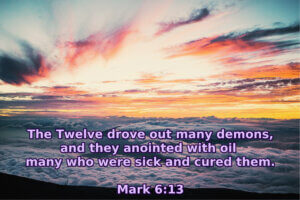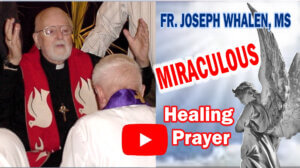
Fr. Joseph Whalen, our founder, blessed this video asking God to give his healing blessing to all who watched it in the most Holy Name of Jesus Christ. (if you have the St. Raphael oil please put a cross shape on your forehead then watch it)
OCTOBER
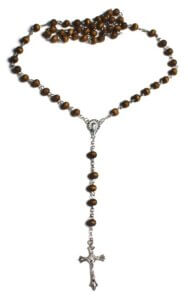
The month of October is dedicated to the Holy Rosary. The Memorial of Our Lady of the Rosary is celebrated on October 7. October falls during the liturgical season known as Tempus per Annum or Ordinary Time (formerly Time After Pentecost), which is represented by the liturgical color green. Green is a symbol of hope, as it is the color of the sprouting seed and arouses in the faithful the hope of reaping the eternal harvest of heaven, especially the hope of a glorious resurrection. The liturgical color green is worn during the praying of Offices and celebration of Masses of Ordinary Time.
The Holy Father’s Intentions for the Month of OCTOBER 2025
For collaboration between different religious traditions: Let us pray that believers in different religious traditions might work together to defend and promote peace, justice and human fraternity. (See also http://www.popesprayerusa.net/)

Prayer for Peace St. John Paul II
Lord Jesus Christ, who are called the Prince of Peace, who are Yourself our peace and reconciliation, who so often said, “Peace to you” – please grant us peace. Make all men and women witnesses of truth, justice and brotherly love. Banish from their hearts whatever might endanger peace. Enlighten our rulers that they may guarantee and defend the great gift of peace. May all peoples on the earth become as brothers and sisters. May longed-for peace blossom forth and reign always over us all. Amen.

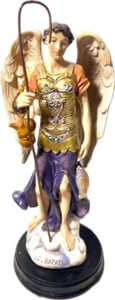

Dear Lord, I pray that you would give me strength to be strong for You in the world today. Lord, you know the struggles that I will face today. Be with me as I go through them. Carry me if I am too weak to move. If I stumble in them, forgive me Father. When I succeed in them, I will praise You! You are worthy of all praise and honor. Amen.

ORDINARY TIME: October 25th




The Forty Martyrs of England and Wales were selected from among the hundreds of Catholics who gave their lives for the faith during the dark days of persecution of Catholics in England. The Forty were canonized by Pope St. Paul VI on October 25, 1970. Six of the Forty were Welsh and celebrate this day as a feast in Wales. These six comprised of a married man, a Franciscan, a Benedictine, two Jesuits and a diocesan priest. The rest of the forty were English martyrs and celebrated on May 4 (listed here).
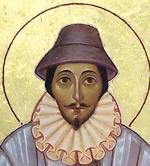 |
St. Richard Gwyn was born about 1537 in Llanidloes, Montgomeryshire. He was a teacher and a married man. He and his wife, Catherine, had six children. He was executed at Wrexham on October 15, 1584. St Richard Gwyn is the Protomartyr of Wales. |
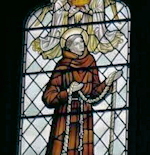 |
St. John Jones, OFM was born at Clynog Fawr, Caernarvonshire around the year 1530. He entered the Franciscan Convent at Greenwich and, at its dissolution in 1559, he went to the Continent and was professed at Pontoise, France. He died for the Faith at Southwark on July 12, 1598. At his execution, he had to wait an hour because the hangman had forgotten to bring the rope! |
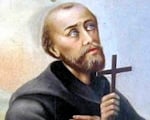 |
St. John Roberts, OSB, born at Trawsfynydd, Merionethshire, was the first prior of St Gregory’s, Douai. He was sent upon the English Mission in December 1602, arriving in England in April 1603. He was probably the first monastic to enter England since the Reformation. He was executed at Tyburn on December 10, 1610. |
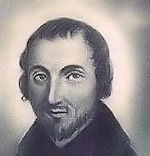 |
St. Philip Evans, SJ was born in Monmouth in 1645. He entered the Society of Jesus on September 7, 1665. He was ordained at Liege and sent upon the English Mission in 1675. He diligently and joyfully served the area of South Wales for four years before his arrest at the house of Christopher Turberville at Sker, Glamorganshire on 4th December 1678. He was martyred at Cardiff on July 22, 1679. He was thirty-four years old. |
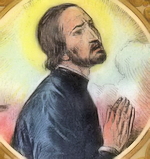 |
St. John Lloyd was Brecon born and studied at Ghent and Valladolid. He was ordained a priest at Valladolid in 1653. He returned to Wales and labored in Brecon and Monmouthshire for 24 years. In November of 1678, he was captured at a house at Penllyn, Glamorganshire. He and St Philip Evans shared a cell at Cardiff Castle until their martyrdom at Cardiff on July 22, 1679. |
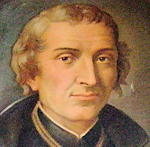 |
St. David Lewis was born in 1616 at Abergavenny, Monmouthshire. He attended the local Grammar school where his father, Morgan Lewis, was headmaster. Ordained in 1642, David entered the Jesuit novitiate in 1645. He returned to Wales and, based at the Cwm, he served the Catholics of the area for 34 years. He was arrested at Llantarnam on 17th November 1678 and martyred at Usk on August 27, 1679. St David Lewis was the last Welsh martyr. |
—Excerpted from Last Welsh Martyr
Highlights and Things to Do:
- If you would like to learn more about the Forty Martyrs you can purchase a pamphlet published by the Catholic Truth Society, A Book of Martyrs by Fr John S. Hogan.
- For a list of the forty martyrs and a little more information about some of them, you can visit this site.
- Read more about the martyrs:
Sts. Chrysanthus and Daria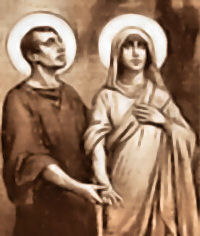
—Excerpted from The Church’s Year of Grace, Pius Parsch
Patronage: Eissel, Germany; Salzburg, Austria
Symbols and Representation: Ox skin; sandpit
Highlights and Things To Do:
- Read more about these martyrs:
Sts. Crispin and Crispinian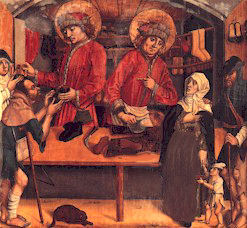
This feast was immortalized by Shakespeare in his play Henry V, (Act 4, Scene 3). The king gave a rousing speech (called “Saint Crispin’s Day) on the eve of the Battle of Agincourt, fought on this day in 1415. (Read a synopsis of the battle.) The English, although outnumbered, soundly defeated the French. In England this was a religious holiday on which commoners and serfs got a day of rest.
Patronage: Cobblers; glove makers; lace makers; lace workers; leather workers; saddle makers; tanners; weavers
Symbols and Representation: Cobbler’s last; shoe; shoemaker’s tools; awl and knife saltire; millstones; flaying knives; rack
Highlights and Things To Do:
- Read more about Sts. Crispin and Crispinian:
- See St. Crispin’s Day for Catechists.
- Shakespeare’s Henry V speech on St. Crispin’s Day: Read the text and watch the excerpt.
- Because of the name “Crisp” and their work as cobblers, a fruit crisp or cobbler is perfect to make on this feast day, particularly apples since it’s close to their harvest time. Try some of the recipes of Catholic Culture, or Catholic Cuisine.
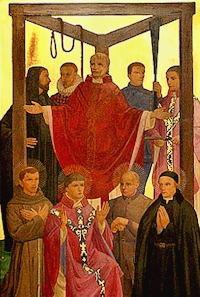
MASS READINGS
October 25, 2025 (Readings on USCCB website)
PROPERS [Show]
COLLECT PRAYER
Twenty-Ninth Week in Ordinary Time: Almighty ever-living God, grant that we may always conform our will to yours and serve your majesty in sincerity of heart. Through our Lord Jesus Christ, your Son, who lives and reigns with you in the unity of the Holy Spirit, God, for ever and ever.

Daily Meditation: Luke 13:1-9
I shall cultivate the ground around it and fertilize it. (Luke 13:8)
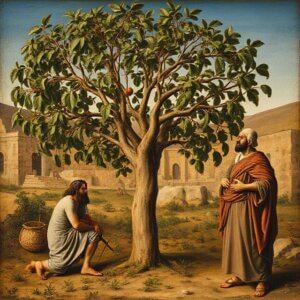
Who would have thought that animal waste could be so important? But that’s exactly why Jesus included it in his parable of the fig tree. He was saying that God often uses the messy “fertilizer” in our lives to help us grow.
You may be in the midst of something messy right now—a painful season in a relationship, a job loss, the effects of your own or someone else’s sin. Whatever it is, it stinks! Yet Jesus, the Master Gardener, uses this mess as “fertilizer” to teach you, to strengthen you, and to bring you closer to himself.
Jesus is so committed to you that he’s not afraid to get his hands dirty cultivating the ground around you. Ponder that for a moment: he is ever patient in pruning and strengthening you. He is completely intentional in the grace he offers you, no matter what hardship you are facing. He doesn’t limit his will for you based on your sins or weaknesses. He sees your potential and the fruit you will bear, and he will use whatever he can to help you bear that fruit.
You may look at your life as it is right now and wonder whether your potential will ever emerge. You may look at your current circumstance and wonder how God could possibly be working in it. But don’t just look at whatever mess you might be in; look at the One who is actively at work to transform you through it. And follow his lead. When you practice patience in suffering, when you speak a word of peace rather than division, you are telling him that you are willing to trust him. Never underestimate what the Master Gardener can do when you let him go to work!
“Jesus, help me to bear fruit for your kingdom!”
Romans 8:1-11
Psalm 24:1-6

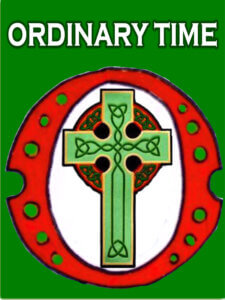
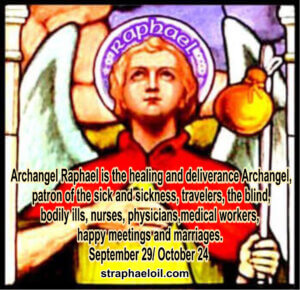

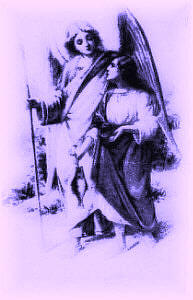
(Hymn at Lauds)
The feast day of Raphael was included for the first time in the General Roman Calendar in 1921, for celebration on October 24. With the 1969 revision of the General Roman Calendar, the feast was transferred to September 29 for celebration together with archangels Saints Michael and Gabriel.
St. Raphael in the traditional calendar (October 24) — which continues to be observed not only in communities which follow the Extraordinary Form of the Roman Rite , but also in those locales where St. Raphael is a patron.

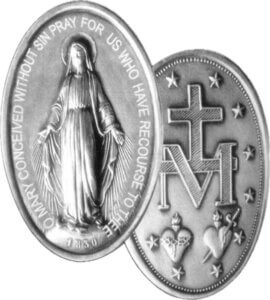
In 1830, one of the apparitions sanctioned by the Roman Catholic Church occurred in the chapel of the Daughters of Charity of St. Vincent de Paul, Rue de Bac, Paris. There were three visions given to Saint Catherine Laboure who, at the time of the first one, was a novice in the order. She was awakened at 11:30 PM on the eve of the Feast of St. Vincent de Paul, by a “shining child” who led her to the chapel where she saw Our Lady, who spoke to her for two hours about the difficult task that lay ahead. Four months later, on November 27 Catherine had the second vision wherein she saw a three-dimensional scene of the Blessed Virgin standing on a white globe with dazzling rays of light streaming from her fingers and she heard a voice say:
“There now formed around the Blessed Virgin a frame rather oval in shape on which were written in letters of gold these words: ‘O Mary conceived without sin, pray for us who have recourse to Thee’
This sacramental from Heaven was at first called simply the Medal of the Immaculate Conception, but began to be known as the Miraculous Medal due to the unprecedented number of miracles, conversions, cures, and acts of protection attributed to Our Lady’s intercession for those who wore it.
Sister Catherine became Saint Catherine in 1947. The church instituted recognition of the apparition in which the Miraculous Medal first appeared for November 27, 1830. Millions of the Miraculous Medal have been distributed, and many graces and miracles have been received through this devotion to Our Lady.
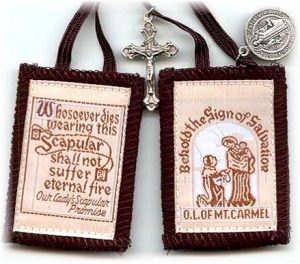
BROWN SCAPULAR OF MT. CARMEL
Virgin Mary’s promise to Saint Simon Stock
July 16, 1251″Wear it devoutly and perserveringly,” she says to each soul, “it is my garment. To be clothed in it means you are continually thinking of me, and I in turn, am always thinking of you and helping you to secure eternal life.”
The scapular is an external sign of the filial relationship established between the Blessed Virgin Mary, Mother and Queen of Mount Carmel, and the faithful who entrust themselves totally to her protection, who have recourse to her maternal intercession, who are mindful of the primacy of the spiritual life and the need for prayer.
THE SABBATINE PRIVELEGE
The blessed Virgin of Mt. Carmel has promised to save those who wear the scapular fromthe fires of Hell; She will also shorten their stay in Purgatory if they should passfrom this world still owing some temporal debt of punishment.
The Blessed Virgin appeared to him and speaking of those who wear the Brown Scapular said: “I, the Mother of grace, shall descend on the Saturday after their death and whomsoever I shall find in Purgatory, I shall free, so that I may lead them to the holy mountain of life everlasting.”
Pope Benedict XV proceeded to grant an indulgence of 500 days for each time the cloth Scapular is kissed”. On July 16th, the Scapular feast, while addressing the seminarians of Rome, Benedict XV said: “Let all of you have a common language and a common armor: the language, the sentences of the Gospel; the common armor, the Scapular of the Virgin of Carmel, which you all ought to wear and which enjoys the singular privilege of protection even after death.”
Pope Benedict XV, addressing seminarians in Rome:“Let all of you have a common language and a common armor: The language, the sentences of the Gospel – the common armor, the Brown Scapular of the Virgin of Carmel which you ought to wear and which enjoys the singular privilege and protection after death.”The Brown Scapular | A Sacramental“One of the most remarkable effects of sacramentals is the virtue to drive away evil spirits whose mysterious and baleful operations affect sometimes the physical activity of man. To combat this occult power the Church has recourse to exorcism, and sacramentals” (The Catholic Encyclopedia., 1913, VXIII, p. 293).The Brown Scapular | A True StoryYou will understand why the Devil works against those who promote the brown scapular when you hear the true story of Venerable Francis Yepes. One day his Scapular fell off. As he replaced it, the Devil howled, “Take off that habit which snatches so many souls from us! All those clothed in it die piously and escape us!” Then and there Francis made the Devil admit that there are three things which the demons are most afraid of: the Holy Name of Jesus; theHoly Name of Mary and the Holy Scapular of Carmel.“Modern Heretics make a mockery of wearing the Scapular. They decry it as so much trifling nonsense.” – St. Alphonsus LigouriMary, Mother of God and Our Mother“When Mary became the Mother of Jesus, true God and true Man, She also became our Mother. In His great mercy, Jesus wished to call us His brothers and sisters, and by this name He constituted us adopted children of Mary.” – St. John BoscoOver the years there have also been many miracles associated with wearing the brown scapular.
*If you would like a brown scapular click here:
